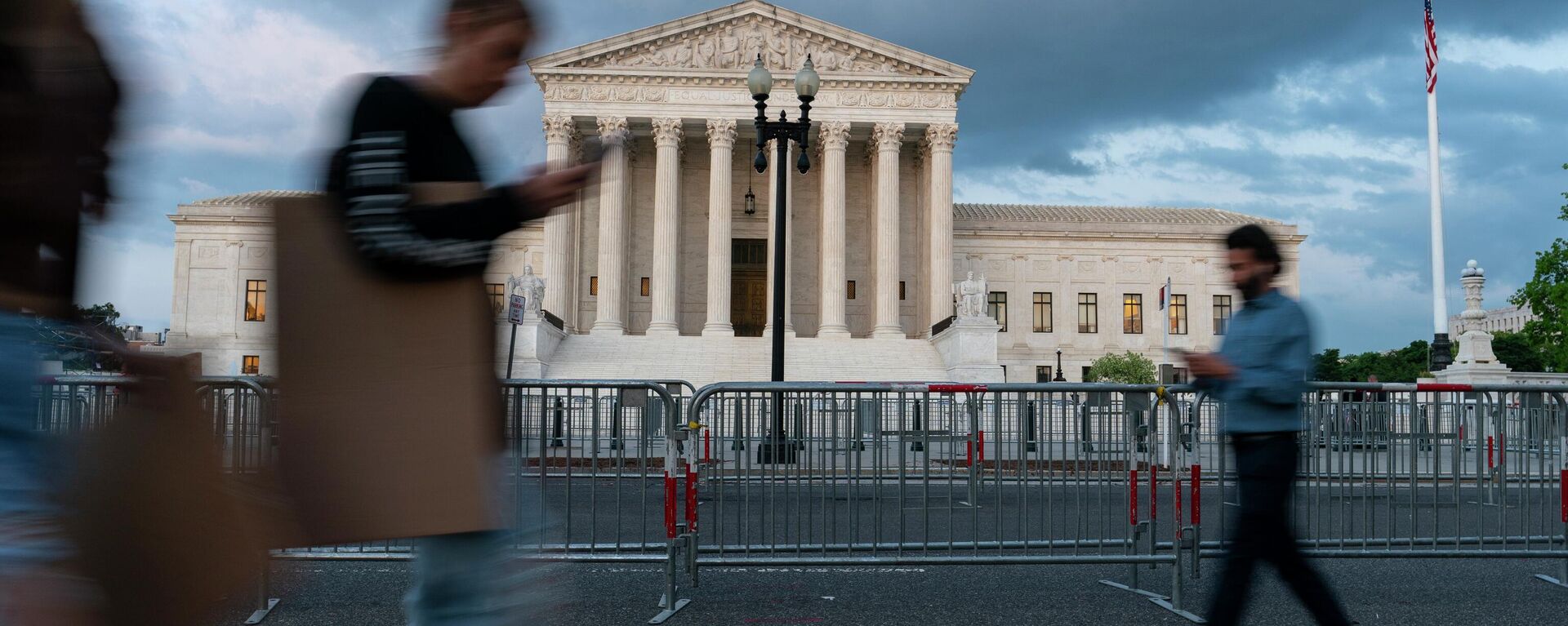https://sputnikglobe.com/20220507/warren-says-she-is-madder-than-hell-amid-scotus-roe-v-wade-calls-on-democrats-to-end-filibuster-1095323733.html
Warren Says She is 'Madder Than Hell' Amid SCOTUS Roe V. Wade, Calls on Democrats to End Filibuster
Warren Says She is 'Madder Than Hell' Amid SCOTUS Roe V. Wade, Calls on Democrats to End Filibuster
Sputnik International
The leak of SCOTUS’ draft of their decision to overturn Roe v. Wade has been met with a wave of outrage from progressives. The landmark case from 1973... 07.05.2022, Sputnik International
2022-05-07T00:07+0000
2022-05-07T00:07+0000
2022-05-07T00:07+0000
us
elizabeth warren
abortion rights
scotus
roe v. wade
https://cdn1.img.sputnikglobe.com/img/07e6/04/19/1095022205_0:258:3072:1986_1920x0_80_0_0_2bf77c7e4519636a01ce758b5bc0c690.jpg
Sen. Elizabeth Warren of Massachusetts believes Democrats should not allow the filibuster to block legislation that would ensure the right of pregnant women to have an abortion without excessive government restriction.The very next day, a fired-up Warren said that she is “madder than hell” and is “determined to fight like hell.”Meanwhile, Democrats in Congress are unlikely to gain the majority of the vote due to the evenly divided Senate. Last year, the Women's Health Protection Act, which guaranteed a woman's right to make that choice, failed to win the support of all Democratic senators.In an interview on Friday, Warren recalled that the author of the document, Supreme Court Justice Samuel Alito, said the constitutional right to abortion can be abolished on the grounds that the Founding Fathers did not write anything about abortion in the constitution.“That oughtta make your gay friends nervous because we don’t have a long history of protecting equal marriage. We don’t have a long history of protecting interracial marriage. We don’t have a long history of protecting access to contraception,” she told ABC’s The View.While one of the most conservative justices of the SCOTUS is himself in an interracial marriage and the use of contraceptives does not require recognition of its constitutionality, the leaked document, prepared by Alito, says the decision in Roe v. Wade was “erroneous,” based on “incredibly weak” argumentation and produced “destructive consequences.”The draft of the document that compiled the opinion of the majority of judges of the Supreme Court was obtained and published by Politico on Tuesday. The legal reasoning, which was said to be prepared in February, is not final and the judges' opinions could change. According to Politico, five conservative judges, Clarence Thomas, Neil Gorsuch, Brett Kavanaugh, Amy Barrett and Samuel Alito, now adhere to this position.In 1973, the Roe v. Wade case was decided 7-2 when five Republican nominees joined two judges appointed by Democratic presidents. The draft opinion represents a strong rejection of this 1973 decision, which guaranteed federal constitutional protections for the right to abortion.If this February's ruling goes into effect, it will overturn the decision of the 5th Circuit Court of Appeals in New Orleans, which held that a Mississippi law is contrary to Supreme Court precedent by seeking to ban abortion before a fetus is viable. It will instead allow each state to decide whether to restrict or completely ban abortion.
https://sputnikglobe.com/20220505/gun-rights-climate-change--migration-how-roe-leak-could-impact-other-important-scotus-decisions-1095293849.html
Sputnik International
feedback@sputniknews.com
+74956456601
MIA „Rossiya Segodnya“
2022
News
en_EN
Sputnik International
feedback@sputniknews.com
+74956456601
MIA „Rossiya Segodnya“
Sputnik International
feedback@sputniknews.com
+74956456601
MIA „Rossiya Segodnya“
us, elizabeth warren, abortion rights, scotus, roe v. wade
us, elizabeth warren, abortion rights, scotus, roe v. wade
Warren Says She is 'Madder Than Hell' Amid SCOTUS Roe V. Wade, Calls on Democrats to End Filibuster
The leak of SCOTUS’ draft of their decision to overturn Roe v. Wade has been met with a wave of outrage from progressives. The landmark case from 1973 protected abortion from being outlawed and gave women the right to choose. Some Democrats have called on Congress to codify this legal precedent into federal law to protect a vital human right.
Sen. Elizabeth Warren of Massachusetts believes Democrats should not allow the filibuster to block legislation that would ensure the right of pregnant women to have an abortion without excessive government restriction.
“Right-wing extremists have hijacked the Supreme Court of the United States,” she said on Wednesday after a public rally against the leaked decision. “We must [expand the Supreme Court] to rebalance it and defend our basic rights, including the constitutional right to an abortion.”
The very next day, a fired-up Warren said that
she is “madder than hell” and is “determined to fight like hell.”
“I am angry because an extremist United States Supreme Court thinks that they can impose their extremist views on all of the women in this country, and they are wrong,” Warren claimed.
Meanwhile, Democrats in Congress are unlikely to gain the majority of the vote due to the evenly divided Senate. Last year, the Women's Health Protection Act, which guaranteed a woman's right to make that choice,
failed to win the support of all Democratic senators.
In an interview on Friday, Warren recalled that
the author of the document, Supreme Court Justice Samuel Alito, said the constitutional right to abortion can be abolished on the grounds that the Founding Fathers did not write anything about abortion in the constitution.
“That oughtta make your gay friends nervous because we don’t have a long history of protecting equal marriage. We don’t have a long history of protecting interracial marriage. We don’t have a long history of protecting access to contraception,” she told ABC’s The View.
While one of the most conservative justices of the SCOTUS is himself in an interracial marriage and the use of contraceptives does not require recognition of its constitutionality, the leaked document, prepared by Alito, says the decision in Roe v. Wade was “erroneous,” based on “incredibly weak” argumentation and produced “destructive consequences.”
“The inescapable conclusion is that a right to abortion is not deeply rooted in the Nation's history and traditions,” Alito writes.
The draft of the document that compiled the opinion of the majority of judges of the Supreme Court was obtained and published by Politico on Tuesday. The legal reasoning, which was said to be prepared in February, is not final and the judges' opinions could change. According to Politico, five conservative judges, Clarence Thomas, Neil Gorsuch, Brett Kavanaugh, Amy Barrett and Samuel Alito,
now adhere to this position.
In 1973, the Roe v. Wade case was decided 7-2 when five Republican nominees joined two judges appointed by Democratic presidents. The draft opinion represents a strong rejection of this 1973 decision, which guaranteed federal constitutional protections for the right to abortion.
If this February's ruling goes into effect, it will overturn the decision of the 5th Circuit Court of Appeals in New Orleans, which held that a Mississippi law is contrary to Supreme Court precedent by seeking to ban abortion before a fetus is viable. It will instead allow each state to decide whether
to restrict or completely ban abortion.


